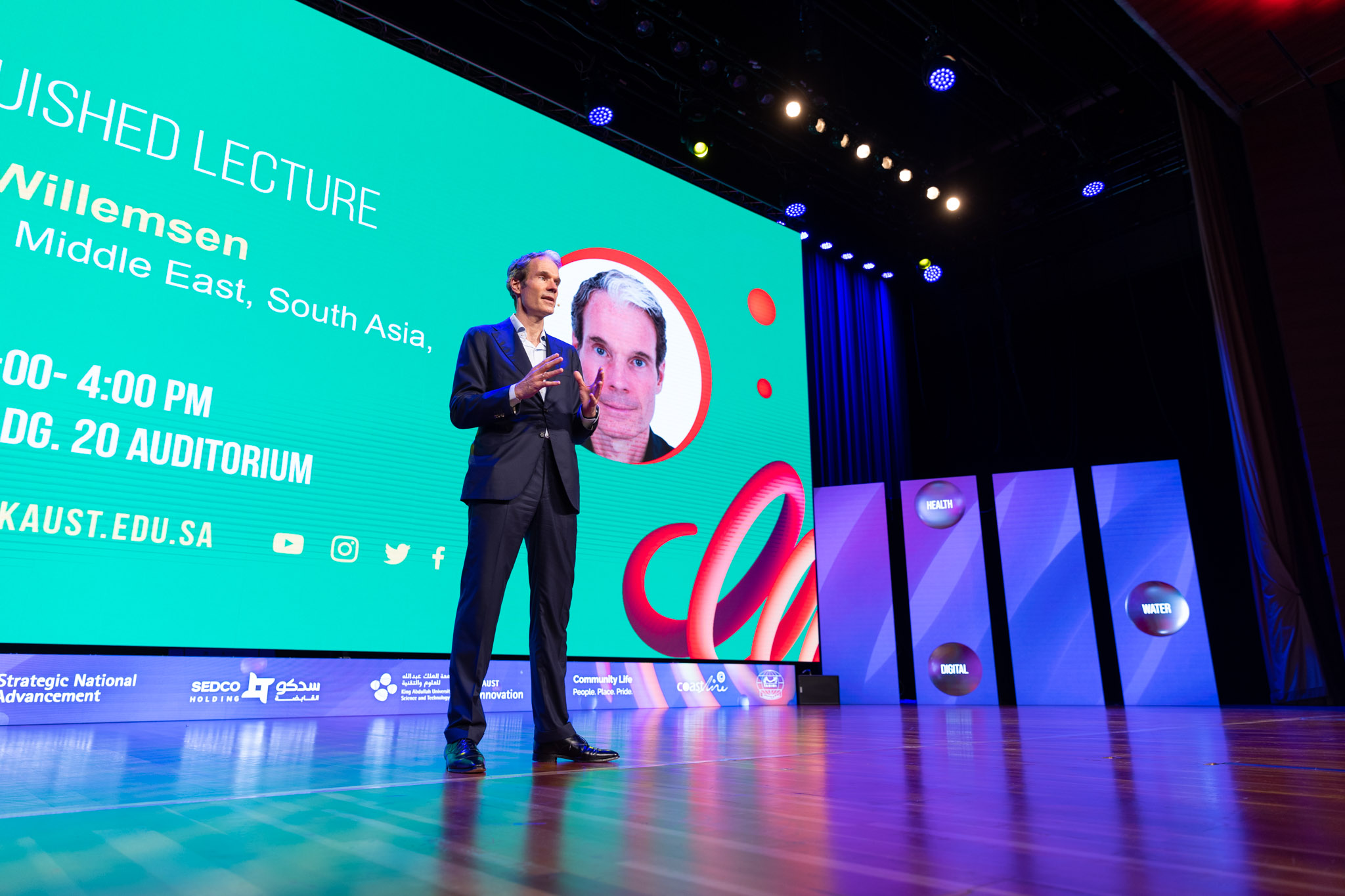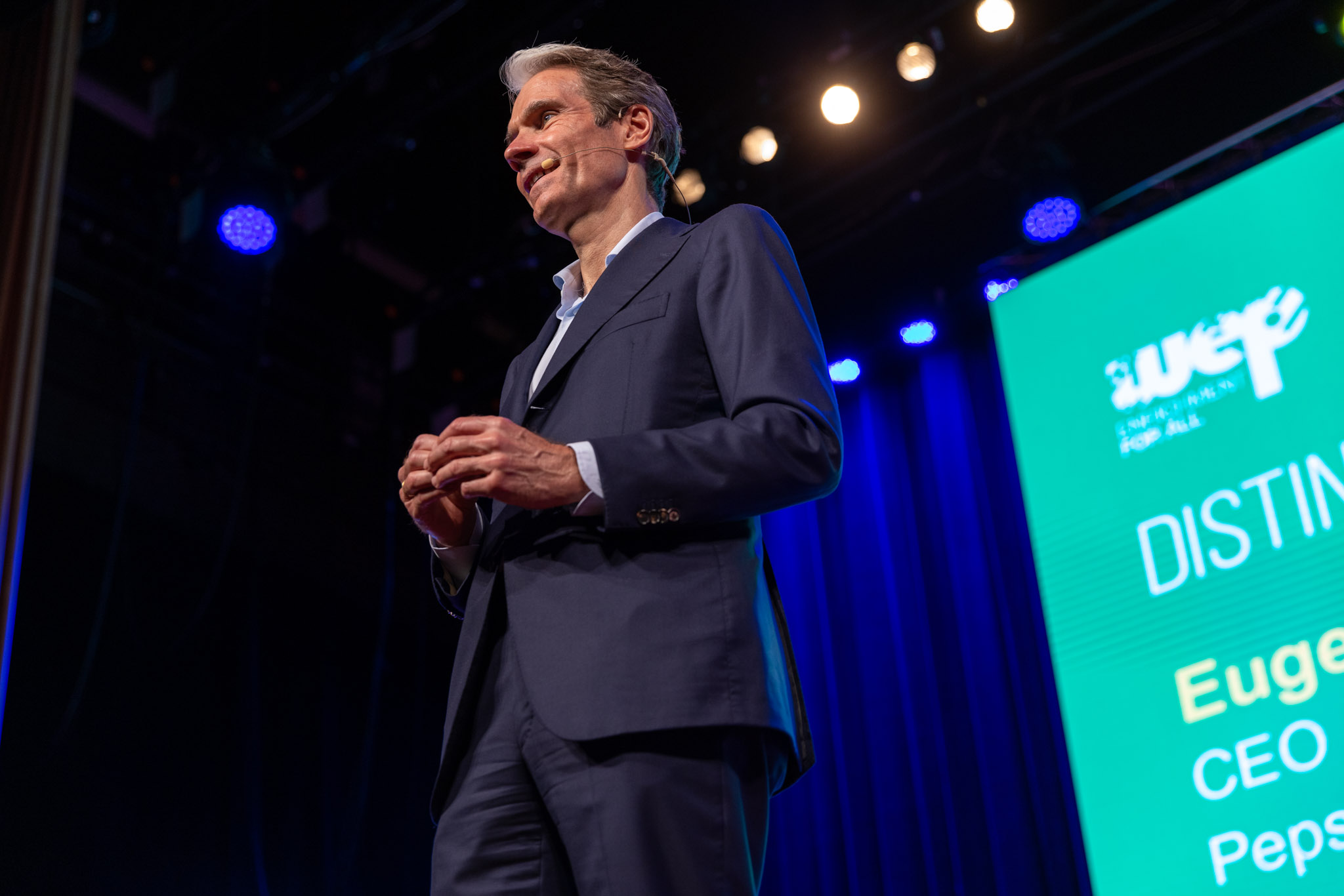Tackling climate and sustainability challenges as a global brand

PepsiCo's Chief Executive Officer of the Africa, Middle East, South Asia (AMESA) division, Eugene Willemsen, speaking at WEP 2022.
The University recently hosted Eugene Willemsen, PepsiCo's Chief Executive Officer of the Africa, Middle East, South Asia (AMESA) division, as part of the annual Winter Enrichment Program (WEP)—which ran from January 9-20. Reflecting WEP 2022's theme of "Resilience," Willemsen gave a Distinguished Lecture on how organizations, including his own, need to think about sustainability in order to tackle the challenges of climate change and other resilience-testing resource emergencies for the future.
Speaking about the COVID-19 pandemic, which has added to the challenges facing humanity, Willemsen said: "The most important lesson it has taught me is that people and organizations are tremendously resilient." As people and organizations have come together to tackle the pandemic through collective and critical efforts, a similar sense of resilience can be applied to joining innovative synergies across industries to help preserve the planet.
"Academic institutions like KAUST can help to provide continued thought-leadership through research to ensure that we are harnessing the collective energy of innovation and driving forward a collaborative approach to a resilient future,” he said.
Some of these steps forward include a faster push toward end-to-end digitization. The pandemic greatly accelerated the digitization of enterprises as a greater reliance on the digital economy became a necessity.
Making positive choices for a more sustainable future
PepsiCo's products are consumed by over one billion people around the globe, with a market reach of more than 200 countries and territories. The world's second-largest food and beverage company, PepsiCo's wide-ranging product portfolio relies on crucial partnerships with farmers, food producers, bottlers, and a myriad of other vendors and suppliers across an interconnected supply chain spanning the globe.
"At PepsiCo, we want to play a leading role in the transformation of the food system. So, the food system from seed to ultimately how people consume and dispose of the foods and beverages that they eat and drink," Willemsen explained.
Through the company's Pep+ (Pepsico positive) initiative, Willemsen leads his AMESA division—comprising 73 countries, including the five big key strategic markets of India, Pakistan, Egypt, South Africa and Saudi Arabia—to execute on a strategic framework impacting and transforming the entire food system. This plan identifies the three main pillars of positive agriculture, positive value chain and positive choices.

"At PepsiCo, we want to play a leading role in the transformation of the food system," said Eugene Willemsen.
"We, as PepsiCo, have a huge agricultural footprint. We work globally with around 100,000 farmers and grow about 25 crops in 60 different countries," said Willemsen. "Ultimately, this represents a big opportunity for us to work with the farming communities and large-scale farmers to contribute to improving soil quality and also to significantly reducing greenhouse gas emissions."
The food and beverage enterprise has an ambitious goal of becoming a net-zero company by the year 2040. "That really means that we need to touch all the different elements within our value chain to make that a reality," he added. This includes everything from the way products are manufactured, transported—via electric vehicle—and down to the packaging used to sell their products. All these elements must be seen through the lens of continually promoting the circular economy.
Working in the Kingdom of Saudi Arabia
Among PepsiCo's 100,000-strong global network of farmers and 30,000 farmers in the AMESA division, 3,000 are from Saudi Arabia. The main crop sourced from Saudi farmers is potatoes, but they also provide a handful of other crop resources.
"We've set ourselves as an objective, by the year 2030, to have all the land that we use for our crops to be used in a regenerative way," as Willemsen outlined. This not only entails protecting the health of the soil but also working to ensure the livelihoods of the farmers, promoting fair living standards and setting up regenerative practices across seven million acres of land PepsiCo uses to grow crops.
In 28 countries, PepsiCo has already achieved 100% sustainably sourced crops.
In the Kingdom. PepsiCo is also working with on-the-ground partners to begin the work of improving packaging and bottle recycling—which remains a big challenge locally.
"The pillars of our packaging strategy are first of all to reduce the amount of packaging we're using but also to set up the appropriate recycling infrastructure in the countries where we operate to ensure that whatever material we're using is being reused," as he elaborates.
Good examples which are already in place include an MoU with Saudi bottling partner National Center for Waste Management and PepsiCo's work with WASCO, one of the largest waste collectors in the Kingdom, to ensure that they collect the equivalent of PET bottles selling under the Aquafina brand.
An important step is that recycled PET plastic was recently approved for food-grade consumption. As 90% of waste in KSA ends up in landfills, scaling up the use of recycled plastic bottles with the help of local stakeholders will go a long way in advancing the circular economy goals of the Saudi Green Initiative.
On the global stage, 22 markets now offer a PepsiCo product in 100% recycled PET packaging.
"We've worked with our KSA partners to create "plastic waste-free" events for the Formula-E races and the Dakar Rally in the Kingdom," as Willemsen pointed out. "PepsiCo has also placed recycling infrastructure across key communities and complexes in Makkah, Jeddah, Abha, Al-Khobar and Riyadh."
Related content
- Winter Enrichment Program (WEP)
-
Plastic bottles could be recycled into chemical filters
- KAUST Organic Chemistry Lab partners with industry to recycle an idea into recyclable plastics

